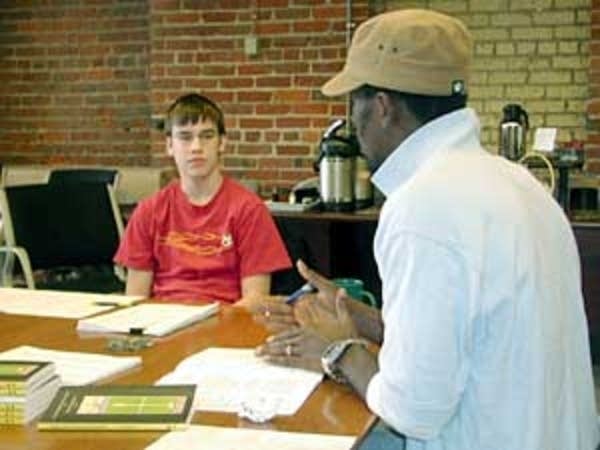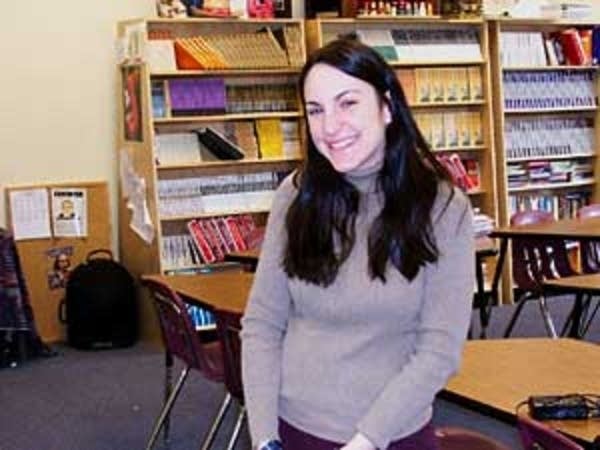The NEA has schools teaching poetry the old-fashioned way
Go Deeper.
Create an account or log in to save stories.
Like this?
Thanks for liking this story! We have added it to a list of your favorite stories.

"OK, I'm gonna do 'O Captain, my Captain' by Walt Whitman, and my name is Casey," says Casey Cavin, 16, of Champlin Park, who is spending his Saturday morning at the Minnesota State Arts Board office.
Cavin is meeting with some coaches. Poetry coaches.

"What you might do is think about projecting just a little more, especially toward the end," says Maplewood poet John Minczeski.
Minczeski and Eagan spoken-word artist Ibe Kaba are helping Cavin get ready for "Poetry Out Loud," a poetry recitation competition sponsored by the National Endowment for the Arts. While Mincezski advises Cavin to be aware of the size of the room he's in, Ibe Kaba praises his vocal delivery.
Turn Up Your Support
MPR News helps you turn down the noise and build shared understanding. Turn up your support for this public resource and keep trusted journalism accessible to all.
"I like the variation in your tone. But you can stand to be a little more animated," he says.
Kaba and Minczeski are also conducting in-class workshops in conjunction with Poetry Out Loud, which is in its first year. Only six Minnesota high schools are participating, mainly because the NEA offered it too late last year for many to get involved.
The program's driving notion is that poetry comes alive when it's read aloud.
The students choose poems from a Web site containing more than 500 of the best-known poems in English literature. They then memorize and later recite them in front of a panel.

They're judged on everything from interpretation, pace and diction to how they stand and the number of words they forget. Each school picks one winner.
The Agricultural Food Science Academy in Vadnais Heights held its schoolwide competition last Friday.
English teacher Stephanie Arnold presided over the event. Arnold says at first, the students hesitated to commit what they viewed as highbrow, musty old poems to memory. But she says as they got involved their outlook changed.
"There's a special alchemy that takes place when you memorize a poem, because it becomes your own," she says. "And after some time the kids really start to speak in that voice."
"This is 'The Battle Hymm of the Republic' by Julia Ward Howe," says one student.

"'Mine eyes have seen the glory of the coming of the Lord...'"
"Hi, I'm Susan Keller, I'm doing 'Siren Song' by Margaret Atwood. 'This is a song that everyone would like to learn, the song that is irresistable...'"
"My poem that I'm doing today is 'What Lips my Lips have Kissed, Where and Why,' by Edna St. Vincent Millay," announces another student.
"'What lips my lips have kissed and where and why...'"
Millay, Longfellow, Whitman. It was as if the students had memorized vast sections of "The Norton Anthology of Poetry." Student Megan Skoglund says she was surprised at how personally connected she became to her poems.
"It's not even your poetry," she says. "It's someone else's. But you can take that and kind of make it your own, and lot of times that pleases people. They like that. So, it's very personal."

Others began to realize why the poems on the Poetry Out Loud Web site are considered timeless. After reading several of them, Geoff Gerardin concluded that the human heart hasn't changed much over time, and the old poets gave him fresh insights.
"When you read their writing sometimes, they can connect stuff for you that you've never even thought of yourself, because its just not presented in today's society," he says. "So it actually helped me a lot, even personally, reading maybe so-called out-of-date writing."
The idea of competition is very much up-to-date. But does competition square with the fundamental value of poetry?
Minnesota State Arts Board Communications Director Sue Jens, who is coordinator of Poetry Out Loud in Minnesota, believes there's no harm in making a game out of learning poetry if the students benefit.
"What we're learning through this is that many students really are interested in poetry, and this raises their interest to a level that maybe some other subjects already have," she says.

The winners from all six participating high schools will meet April 20 at the Minnesota History Center in St. Paul for the state finals. The winner there gets an all-expense trip to Washington for the national finals on May 16, where a total of $50,000 in scholarships and stipends will be up for grabs.



